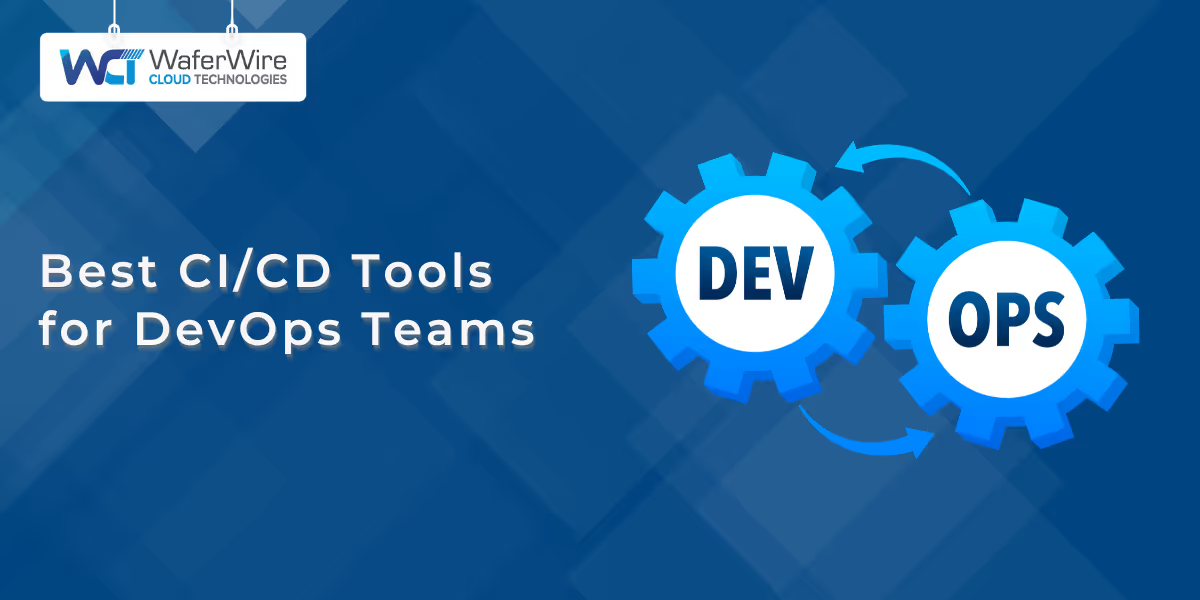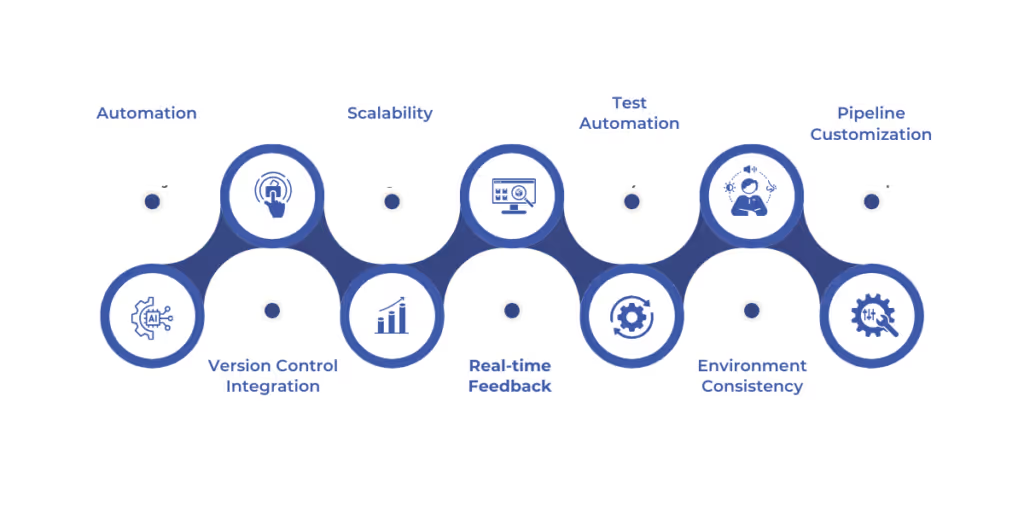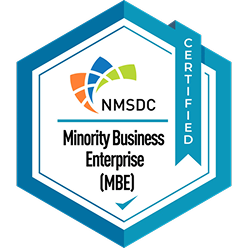
Best CI/CD Tools for DevOps Teams
Murthy S
2025-03-23

Talk to our cloud experts
Subject tags
DevOps teams are under constant pressure to accelerate software delivery while maintaining quality and stability. Yet, many struggle with inefficiencies, manual errors, and delayed deployments, which hinder their progress.
A study by HCL indicates that companies using CI/CD pipelines can achieve up to 30% faster time-to-market and more reliable releases. This statistic underscores the transformative power of the right CI/CD tools.
By automating key processes and streamlining workflows, these tools help DevOps teams meet the growing demands for faster, more efficient software development. In this guide, we’ll explore the top CI/CD tools that are making a significant impact. Let’s start with the basics!
What is CI/CD Software for DevOps Teams?
CI/CD software refers to a set of tools and practices that automate the processes of continuous integration (CI) and continuous delivery (CD) in software development. Continuous integration involves the frequent merging of code changes into a shared repository, followed by automated builds and tests to detect issues early.
CI/CD enables organizations to deliver software more frequently and reliably. For instance, organizations that have mastered CI/CD deploy 208 times more often and have a lead time that is 106 times faster than those that have not.
This software is designed to support a smooth, automated workflow, minimizing manual intervention while improving software quality and consistency. Now, we will explore the key characteristics of top CI/CD software.
Key Characteristics of Top CI/CD Software

CI/CD tools for DevOps teams facilitate continuous integration and delivery by offering features that support automation, testing, monitoring, and deployment. The key characteristics of the best CI/CD software are as follows:
Automation: Automates code integration, testing, and deployment, reducing manual effort and human errors.
Version Control Integration: Seamlessly integrates with version control systems like Git to manage code changes.
Scalability: Supports scaling workflows to accommodate growing projects and larger teams.
Real-time Feedback: Provides immediate feedback on code quality, allowing developers to address issues quickly.
Test Automation: Incorporates automated testing tools to ensure that code changes do not introduce errors.
Environment Consistency: Ensures consistent environments across development, testing, and production stages.
Pipeline Customization: Offers customizable pipelines to match specific team needs and workflows.
These are some of the key elements of CI/CD software that you should look for when selecting one for your DevOps teams. In the following section, we will explore the benefits of CI/CD software and how these features contribute to improved software development processes.
Benefits of CI/CD Software
CI/CD software offers a wide range of benefits that enhance the efficiency and reliability of the software development lifecycle. By automating key processes, these tools enable teams to deliver higher-quality applications faster. The benefits of CI/CD software are as follows:
Faster Time-to-Market: Automates repetitive tasks, enabling quicker deployment and reducing the time required to deliver updates or new features.
Improved Code Quality: Continuous testing and integration help identify bugs and errors early, ensuring higher-quality code.
Increased Efficiency: Streamlines workflows by automating integration, testing, and deployment, freeing developers to focus on more critical tasks.
Reduced Manual Errors: Automation minimizes human intervention, reducing the risk of errors during integration or deployment.
Better Collaboration: CI/CD fosters a collaborative environment where developers can work more effectively together, improving overall team productivity.
Consistent Deployments: Automated processes ensure that every deployment follows the same steps, promoting consistency and reducing discrepancies.
Enhanced Security: Continuous security testing integrated into CI/CD pipelines helps detect vulnerabilities early, improving overall application security.
These are just a few benefits that you can get from CI/CD software. Next, we will review the top 5 CI/CD tools for DevOps teams, focusing on their key features and how they help optimize development workflows.
Top 5 CI/CD Tools for DevOps Teams
There are several options available in the market, each offering unique features that cater to different team needs. In this section, we will explore some of the CI/CD tools that are widely used by DevOps teams, highlighting their key functionalities. Here are 5 best CI/CD tools for DevOps teams:
1. OpenShift Pipelines
OpenShift Pipelines is an open-source CI/CD tool designed for Kubernetes environments. It allows DevOps teams to automate their software delivery pipeline using Kubernetes-native resources.
Built on top of Tekton, OpenShift Pipelines integrates with OpenShift's container-based platform, enabling seamless development, testing, and deployment processes. Teams can create complex, customized pipelines with ease, leveraging the power of Kubernetes to scale operations effectively.
By automating the build and deployment process, OpenShift Pipelines ensures that code is continuously integrated and delivered, helping teams achieve faster release cycles with fewer errors.
Key features:
- Tekton-based serverless architecture that runs pipelines in containers, eliminating the need for dedicated Jenkins servers and providing true isolation between pipeline runs
- Built-in integration with OpenShift's internal registry and image streams, allowing seamless deployment of container images without external registry configuration
- Native Kubernetes resource model where pipeline tasks are defined as custom resource definitions (CRDs), enabling GitOps workflows and management through standard Kubernetes tools
- Workspace-based artifact sharing between tasks that uses Persistent Volume Claims (PVCs) instead of traditional artifact repositories, simplifying pipeline configuration
- Operator-based installation and management that automates upgrades, security patches, and configuration changes without disrupting running pipelines
Pros:
- Supports Kubernetes-based workflows
- Easily integrates with OpenShift
- Flexible and customizable pipeline options
Cons:
- Requires Kubernetes expertise
- Steeper learning curve for new users
2. GitHub Actions
GitHub Actions provides an automated workflow for continuous integration and continuous deployment (CI/CD) within DevOps teams. It allows developers to define and automate software development processes directly within GitHub repositories.
The tool helps in building, testing, and deploying applications efficiently by using YAML-based workflows. It integrates seamlessly with GitHub’s ecosystem, reducing the need for external CI/CD tools.
Developers can automate testing on multiple platforms, trigger workflows based on specific events, and deploy code to various environments. Its scalability and built-in security features support both small and enterprise-level projects, ensuring streamlined software delivery.
Key features:
- Matrix builds that allow simultaneous testing across multiple operating systems, language versions, and dependencies with a single workflow configuration
- Built-in secret store with environment-specific secrets management, eliminating the need for external secret management solutions
- Workflow reusability through composite actions and reusable workflows, enabling teams to share CI/CD components across repositories
- Event-driven automation beyond just CI/CD, supporting webhook events like issues, pull requests, discussions, and repository dispatches to automate entire DevOps workflows
- Self-hosted runners with auto-scaling groups that can be deployed in private infrastructure while maintaining seamless GitHub integration
Pros:
- Easy GitHub integration
- Supports multiple environments
- Automates testing and deployment
- Scalable for large projects
Cons:
- Requires YAML knowledge
- Debugging can be complex
3. CircleCI
CircleCI enables DevOps teams to automate software testing and deployment with efficiency. It supports cloud-based and self-hosted workflows, allowing teams to build, test, and release applications seamlessly.
Its configuration is managed through YAML files, providing flexibility in defining pipelines. CircleCI optimizes build times with caching and parallel execution, reducing delays in development cycles. It integrates with major version control systems and supports containerized builds for better scalability.
The tool’s robust monitoring and insights help identify bottlenecks, ensuring smooth delivery. With built-in security measures, it provides a reliable platform for handling CI/CD processes in diverse environments.
Key features:
- Orbs ecosystem that provides reusable, shareable packages of configuration with built-in parameterization for common tools and services
- Resource class selection that allows precise control over CPU and memory allocation for different job types within the same workflow
- Test splitting and parallelism that automatically distributes tests across multiple containers based on timing data to minimize build times
- SSH access into running build environments for real-time debugging of failed jobs without needing to recreate the failure locally
- Context-based secrets management that separates security concerns from projects, enabling organization-wide secret distribution with granular access control
Pros:
- Fast build execution
- Supports cloud and on-premises setups
- Parallel testing speeds up workflows
- Detailed insights and monitoring
Cons:
- Requires YAML knowledge
- Complex setup for beginners
- Slower support response
4. Argo CD
Argo CD is a declarative GitOps continuous delivery tool designed for Kubernetes environments. It enables DevOps teams to automate and manage application deployments using Git repositories as the source of truth.
The tool ensures that the desired application state defined in Git matches the actual state in Kubernetes clusters. It supports automated syncing, rollback mechanisms, and real-time monitoring of deployments.
Argo CD simplifies multi-cluster management and enhances security by enforcing strict access controls. Its visual dashboard provides clear insights into application states, making it easier to track changes and resolve discrepancies in deployments efficiently.
Key features:
- Automated drift detection and visualization that continuously compares live state against desired state, automatically highlighting configuration drift with visual differentials
- Multi-tenancy with RBAC that enables segregation of applications across teams while maintaining centralized governance through project-based access controls
- ApplicationSets controller that enables automated, templated application deployment across multiple clusters and environments through a single definition
- Webhook-driven automated synchronization with customizable sync windows, allowing precise control over when automatic deployments can occur in specific environments
- Built-in rollback capabilities with revision history that tracks all deployment changes, enabling one-click restoration to any previous known-good state
Pros:
- GitOps-based deployment automation
- Real-time monitoring and rollback support
- Simplifies Kubernetes cluster management
Cons:
- Limited support for non-Kubernetes environments
- Initial setup can be time-consuming
5. Jenkins
Jenkins is an open-source automation server that helps DevOps teams build, test, and deploy applications efficiently. It supports extensive customization through plugins, allowing teams to tailor their CI/CD pipelines based on project requirements.
Jenkins can integrate with various version control systems, cloud platforms, and containerization tools. It enables parallel execution of tasks, reducing build times and improving workflow efficiency. With its scripting support, teams can define complex automation workflows.
Jenkins also offers distributed builds, making it scalable for large projects. Its active community ensures continuous updates and improvements, making it a reliable choice for managing CI/CD processes.
Key features:
- Pipeline as Code with Jenkinsfile that allows defining complete delivery pipelines using Groovy DSL, enabling version control and code review of CI/CD processes
- Multi-branch pipeline projects that automatically discover and build branches and pull requests, applying different pipeline configurations based on branch patterns
- Agent/controller architecture with dynamically provisioned, heterogeneous build agents that can spin up on-demand across multiple platforms and cloud providers
- Distributed builds with workspaces that can cache dependencies and artifacts between builds, significantly reducing build times for large projects
- Extensive plugin ecosystem with over 1,800 community-maintained integrations, enabling connections to virtually any tool in the DevOps landscape without custom code
Pros:
- Highly customizable with plugins
- Supports parallel execution
- Works with multiple cloud providers
- Scalable for large projects
Cons:
- Requires manual setup and maintenance
- Can be resource-intensive
- Security configurations need extra attention
These are some of the top CI/CD software in the market for DevOps teams. Let’s have a quick comparison of these 5 tools for better understanding.
FeatureOpenShift PipelinesGitHub ActionsCircleCIArgo CDJenkinsTypeKubernetes-native CI/CDGitHub-integrated CI/CDCloud & Self-hosted CI/CDGitOps CD toolOpen-source automation serverBest ForKubernetes workflowsGitHub-based projectsFast cloud buildsKubernetes deploymentsHighly customizable automationHostingSelf-hosted (OpenShift)Cloud & Self-hostedCloud & Self-hostedSelf-hosted (Kubernetes)Self-hostedEase of UseModerateEasyModerateComplexComplexCustomizationHigh (Tekton-based)ModerateHighModerateVery HighIntegrationOpenShift, KubernetesGitHub, DockerGitHub, Bitbucket, DockerKubernetes, HelmVarious VCS, Cloud, DockerDeployment ModelCI/CDCI/CDCI/CDCD (GitOps)CI/CDParallel ExecutionYesLimited (Free Plan)YesYesYesSecurity FeaturesRBAC, Policy enforcementGitHub’s security featuresContainerized buildsRole-based accessRequires manual configurationScalabilityHighModerateHighHighHighPricingIncluded in OpenShift plansFree for public repos, Paid for private workflowsFree plan available, Paid from $15/monthOpen-source (Free)Open-source (Free)Rating (out of 5)44.24.34.13.8
Each of these CI/CD tools has its strengths, making them suitable for different DevOps needs. Choose the one based on your preferences and needs, like ease of use, customization, scalability, and integration with existing workflows.
Conclusion
Selecting the best CI/CD tool is crucial for optimizing DevOps workflows, ensuring faster deployments, and maintaining software reliability. The ideal tool should align with project requirements, support seamless integrations, and offer scalability for growing development needs.
Security, ease of use, and automation efficiency are key factors in making an informed choice. By adopting a robust CI/CD pipeline, teams can enhance collaboration, reduce manual errors, and accelerate software delivery. In an ever-evolving tech landscape, continuous evaluation and adaptation of CI/CD tools will drive innovation, streamline operations, and maintain a competitive edge in modern software development.
To level up your DevOps teams, try our SRE & DevOps Services. Here at WaferWire, we offer you seamless scalability and faster software delivery with our SRE & DevOps services.
Our team ensures reliable, high-performing infrastructure through proactive monitoring and automation, driving operational efficiency and long-term success. Contact us today to future-proof your business with cutting-edge solutions designed to adapt and grow with you.
Subscribe to Our Newsletter
Get instant updates in your email without missing any news

Copyright © 2025 WaferWire Cloud Technologies




.png)












